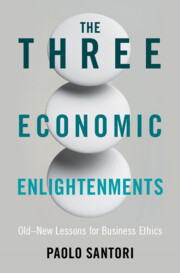1 - Introduction
Published online by Cambridge University Press: 04 November 2025
Summary
The Introduction presents the background, scope, aims, and outline of the book. The starting point is the necessity of broadening the range of normative ethical theories used in business ethics. In addition to the three main theories – consequentialism, deontology, and virtue ethics – there are other frameworks that can assist researchers and students in addressing moral dilemmas in market contexts. Western philosophy presents another triad: political economy (Adam Smith), civil economy (Antonio Genovesi), and moral economy (Immanuel Kant). The first part of the book will show how these theorists provide distinct perspectives on the ethics of market transactions, grounded in moral principles and reasoning applicable to economic agents. The book’s second section focuses on applying the three moral principles to three fictional case studies concerning incomplete contracts.
Information
- Type
- Chapter
- Information
- The Three Economic EnlightenmentsOld–New Lessons for Business Ethics, pp. 1 - 20Publisher: Cambridge University PressPrint publication year: 2025
